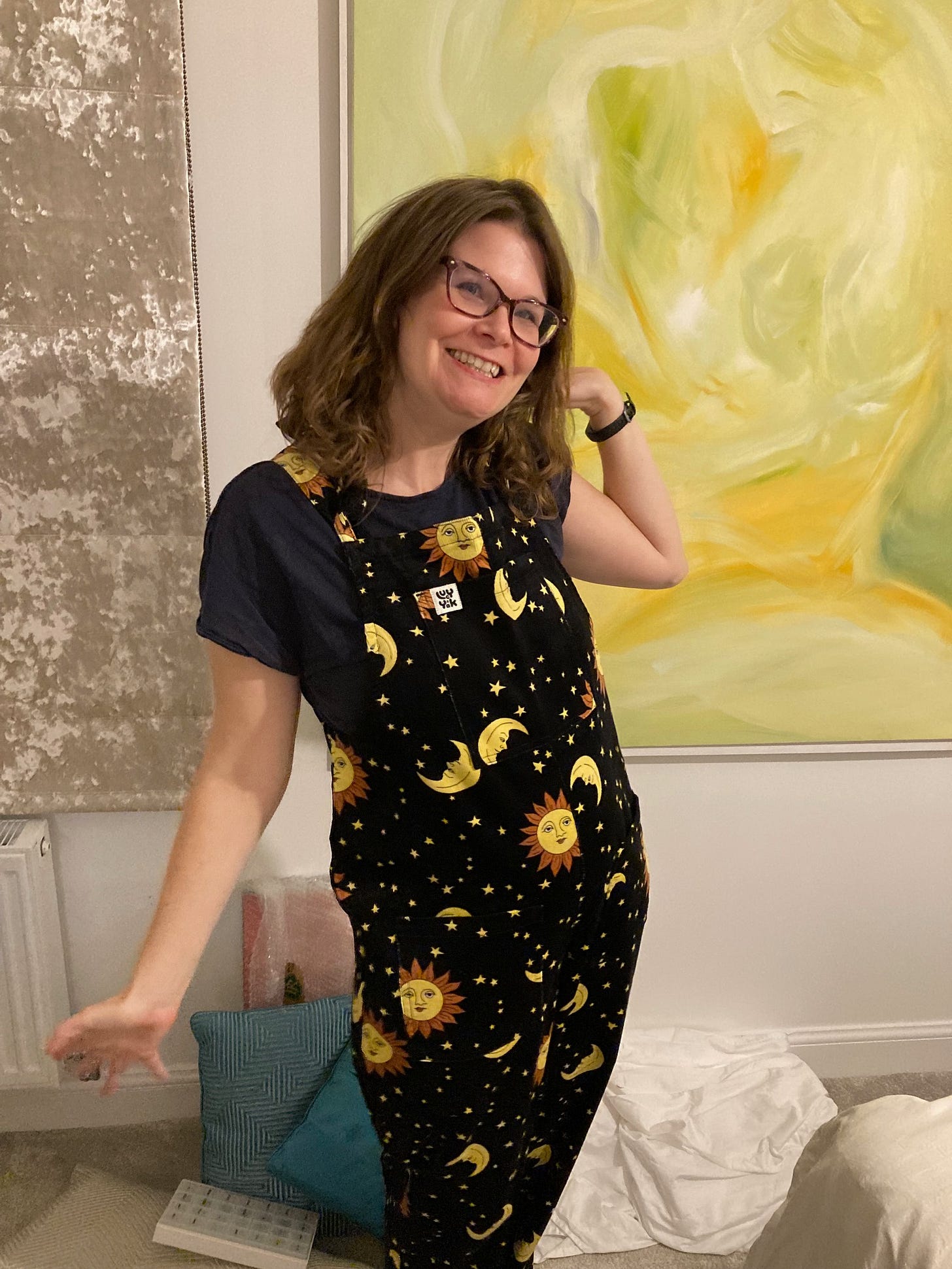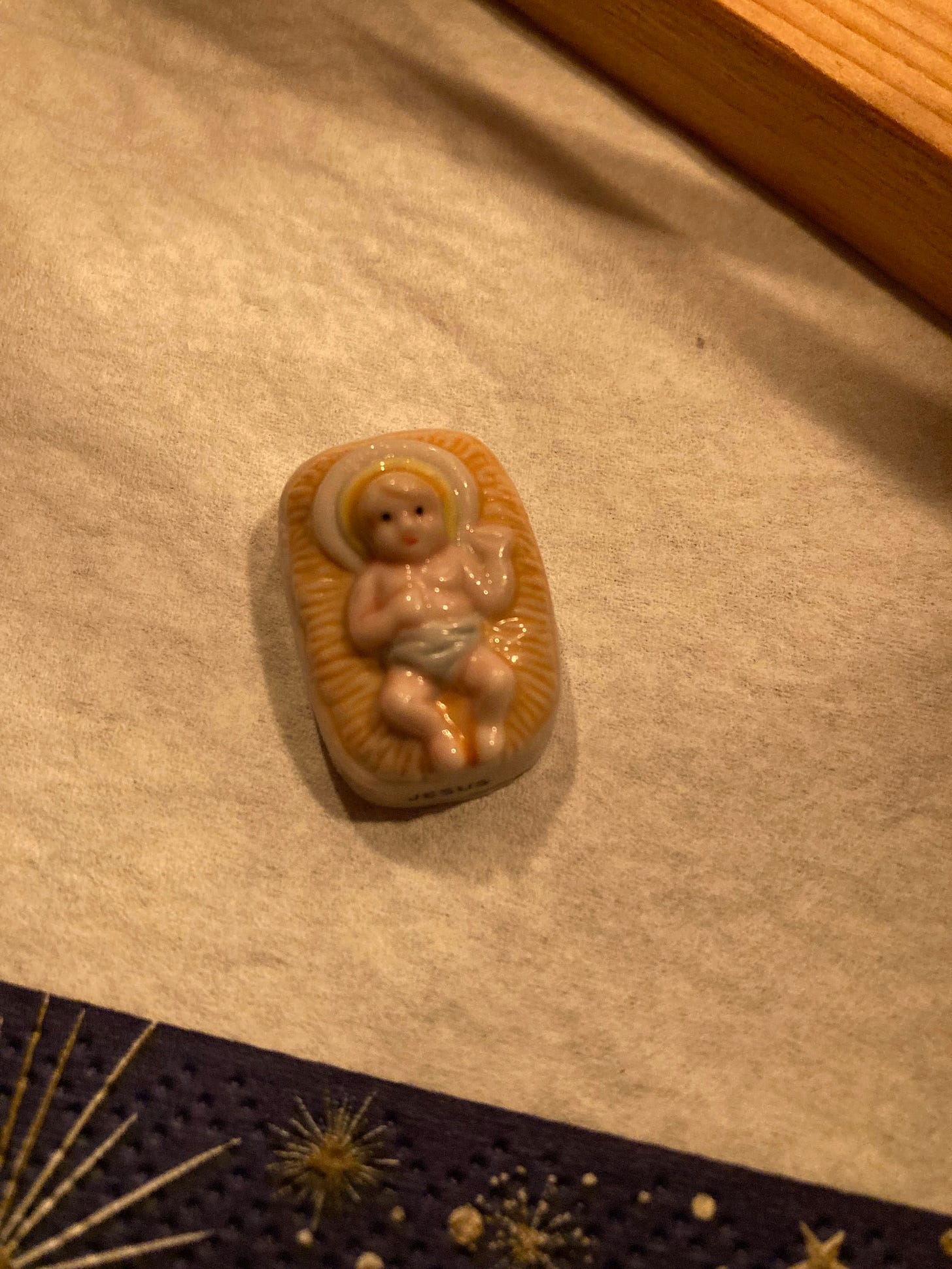[cute dungarees a present from Jenny Rowbory - who needs hope more than anyone I know right now - do check out her story]
Well, hello there. It’s the season of Epiphany in the liturgical calendar, which kicks off with a celebration of the three (or more) wise men (and perhaps women) who brought gifts to the infant Jesus. This year, we celebrated with a traditional French Galette Des Rois on the 6th January. It’s an almond flavoured pie, and the fun part is that you put a ceramic bean, or ‘fève’, somewhere in it and whoever gets served it gets to be ‘king’ for the day and decide what to do. You can get these fèves as ceramic nativity pieces, and so it happened that our boy narrowly avoided breaking his teeth on baby Jesus, and got to dictate what we did for the rest of the evening. Pie and familial dictatorship - what’s not to love here?
Over December, our family came down with Covid. It was my first time, and the second time for Jon and the boy. Although I had weird neurological symptoms from it and looking briefly like I might need to be hospitalised, I somehow won the NHS lottery (and it really is a lottery at the moment) and got treatment for Covid, so my recovery has been relatively straightforward. We had some scary times with the boy, who already has Long Covid and was very ill with Covid, but thankfully he now seems to be steadily recovering from being bedbound with it.
It was a reminder again of how much our health hangs in the balance, and how having a chronic illness in a pandemic makes planning that much more difficult.
That’s why, when friends asked us an innocent question at New Year, ‘What are your hopes for this year?’ I instantly recoiled.
Over the past four years especially, and – let’s face it – the past fourteen years, I have seen my hopes dashed cruelly, over and over again. To hope feels like a dangerous thing.
The many and varied definitions of hope
(and why it’s important)
It got me thinking about what we mean by hope. Most of the people round the room on New Year’s Eve were able to list their hopes for the year. I noticed that the things they listed as hopes could in fact be described as probabilities, based on their previous experience. The ones with the hobby hoped to improve it, the ones will studies hoped to finish it, and they were all reasonable expectations of the year ahead.
This is hope as prediction. It works well when your life is going along a positive trajectory and you’re anticipating more of the same. We call this hope, but it’s based mainly on confidence and only a little bit of uncertainty. In this situation, the opposite of hope is anxiety - we anticipate that bad things will happen based on our situation in the past.
What if your life has been on a solid trajectory of tragedy after tragedy, yet you anticipate that positive things will happen? One word for it is hope; another is madness. According to Einstein (allegedly), “Insanity is doing the same thing over and over and expecting different results.”
Though I’m being a little tongue-in-cheek here, it is worth noting that some hope can be harmful. Think of the woman in a relationship with a man who persistently insults her, yet she stays with him because every now and again he does something that gives her hope that he will change. How long is it wise to live in that kind of hope? Sometimes hope is actually wilful delusion. The opposite of hope here is sanity, realism.
“You’ve got to keep hoping,” is a statement often said to the chronically ill or disabled person. It’s meant as an encouragement but often it feels like a heavy burden, like it’s an obligation to keep hoping so that you still stay positive for the people around you. You’re not allowed to give up hope. Some even claim that you can’t get better unless you’re hoping or thinking positively, which is all kinds of nonsense, but very pervasive in our society.
Hope is a loaded term when you have chronic illness, because it’s often associated with dashed hopes. It goes like this: you hope you get better; you make a little progress; your hope grows; you have a ‘crash’ deterioration in your health; you grieve that hope and adjust to your new normal, which is often worse than when you started hoping.
Think of the couples who struggle with fertility. Hope is the thing that keeps you going in the early months, but it becomes like a trick and something that drains you as the years go on. For couples who are infertile, giving up hope after years of trying can release them to grieve and move on.
For those with chronic illness who are told to hope for healing, hope’s opposite can be ‘acceptance’. Rather than be discontent with the present situation, always hoping for better, there’s power and freedom in deciding to be content with what is.
Here’s another opposite of hope: certainty. Hope implies uncertainty, though the writer of the Hebrews likes to tell us our hope is ‘a sure and steadfast anchor of the soul’ (Hebrews 6:19) because we can have such confidence in God. Hope necessarily means we can’t know for sure what the outcome will be, but we’re choosing to anticipate that it will be something positive. It is close to faith in this sense - a leap into the unknown.
Paul’s description of hope was waiting for what would come, “…But hope that is seen is no hope at all. Who hopes for what they already have? But if we hope for what we do not yet have, we wait for it patiently.” (Romans 8:24–25). Here, hope is about patience, like waiting for a gift at Christmas. We don’t yet hold it, but it will come. Hope’s opposite is ‘possession in the here and now’.
Hope and its opposites
To recap, here are the different ways we use hope:
Hope as confident prediction. Its opposite is anxiety.
Hope as wilful delusion. Its opposite is realism.
Hope as obligation. Its opposite is a grieving process.
Hope as wishful thinking. Its opposite is acceptance.
Hope as faith. Its opposite is certainty.
Hope as patience. Its opposite is possession.
Hope is not always a positive thing, and can even be dangerous. Hope is this slippery thing that merges into other things like denial, faith or patience, and sometimes we say ‘hope’ meaning one thing and person we’re talking to receives the word as something totally different.
Hope as positive imagination
My friend, the practical theologian Dr Sarah Dunlop, described hope as ‘positive imagination for the future’, and I have clung to that idea. Hope’s opposite is perhaps most usually described as ‘despair’. Despair is when we look around and find not only nothing good, but not even the possibility of nothing good. Hope cracks a window in the darkness, and points to a sliver of light, even if we don’t know how we’ll reach it.
Though I have my issues with hope, I love the idea of imagination and creativity tied up in hope. With this definition, I can look at the world at war and still hope for world peace. It’s not wilful delusion despite the evidence, it’s defiant and prophetic, refusing to accept that killing is inevitable.
Social justice always starts with hope, with a person who can say, ‘This is how it is, but I have a vision for something better.’ Hope as imagination means I am not kidding myself about certainties, but I am choosing to use creativity to consider positive possibilities. It gives me freedom for it not to come to pass. I can simultaneously imagine a positive future of healing as well as a positive future of contentment in my illness, a Shrödinger’s hope where two contradictory realities are both positive.
Hope as positive imagination. Its opposite is despair.
This year, I am gingerly playing with the concept of hope and trying to reclaim it as something that can include me.
I still have in my head the line from the Christmas carol, ‘The hopes and fears of all the years // are met in thee tonight.” I’d never before seen there that Jesus represented hopes AND fears. I think about what was involved in Jesus’s incarnation: divine yet human, sinless yet suffering, glorified and frustrated, dead and resurrected, comforting the uncomfortable and discomfiting the comfortable. Hope in Jesus is hope in the one who experienced it all; hope in Jesus not a naive cure-all for all our ills but hope in the beautiful and complex person of Jesus and the good ending despite the difficult, long, middle.
Over to you:
As you enter this year, which definitions of hope most speak to you?
Which are you most drawn to?
Which describe your experience?
Where do you find hope?
Thanks, as ever, for joining me on this journey.
Tanya






Hi Tanya, I first heard you speak at Evolving Faith in 2019. I also believe we have a mutual connection in Tara Owens. I am not sure how often you are publishing, but this is the first time I've received your newsletter despite having signed up a ways back. It was the perfect first one to receive. Chronic illness and a revolving door of stressful events have led me to a place last summer where I wanted to send the word hope to the moon and then it hit me extra hard at New Years as well. This post helped me feel less alone, thank you for writing it and sharing.
Thank You, I know you mean well. We forget what Job had to go thru...God&his bettn' buddy Satan had loads of FUN watching poor Job jump thru hoop after pure evil horrid hoop! Humans are Gods sick joke, heaven has to laugh or go live in N.K. only the beginning of hell.....
I'll leave you alone now. Thank you again!